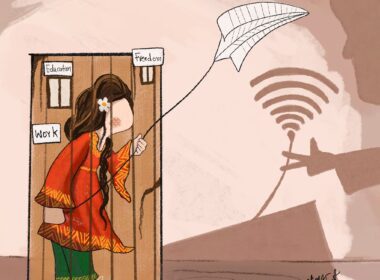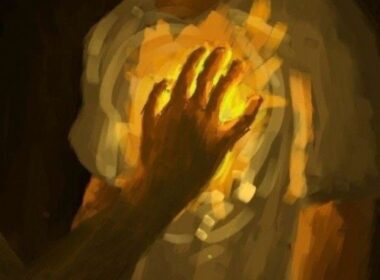Chassis
By Safa Niazi

Sumayyah sits on the bench in the schoolyard, thinking about her father and their last conversation from the night before. Last night, her father was lying on the mattress; her mother was massaging his temples, and the knot between her father’s eyebrows kept opening and closing. Her mother was quietly praying for her husband’s recovery so that he would feel better. The stress of building a new life, in a new country as immigrants, was exhausting him.
As always he told us to have faith.
It’s a bright day today. She pulls her headscarf forward to create an umbrella against the sunlight. Apparently, this first parent-teacher meeting between her father and her new teachers will last an hour. She picks up the chassis from beside her, one of her artworks in progress, and places it on her knee. She has a hopeful look, and with thin, frail fingers, she draws on the plywood and says, “I don’t know if they’ll allow it, but maybe God will work a miracle and Father will succeed.”
She takes 2B and 8B pencils out of a small bag; she’s used her pencils so much that they’re now no bigger than her pinkie finger. She sighs and says, “Where am I going to take this sorrow now? I’ll have to go hungry again and save up my pocket money to buy a new pencil.” She takes the special design stencil that her father brought home yesterday out of the folder and moves it around on the drawing board. She begins to doodle the image before her eyes; she sees a tree, and a nest is visible on the high, slender branches. A completely new nest, in fact, it’s not finished yet. Sumayyah says under her breath, “They might have thought the new house was better and safer.” Birds, just like us, are looking for a better place to live.
She watches a bird arrive; it brings a few twigs in its beak and places them on the nest like bricks. Sumayyah’s mind calls this bird the father of the family. Her eyes fall on the second bird, which is sleeping in the middle of the nest with its head tucked under its wings. The first bird flies off again. The speed of Sumayyah’s gaze between her sketch and the live image of the tree is as rapid as a heartbeat. If someone saw her, they’d think Sumayyah was drawing with her eyes closed. She watches the first bird arrive again; it hasn’t dropped the debris it’s carrying as it’s confronted with a scene that’s unfolding in the nest.
Sumayyah’s gaze slows and turns towards them. She watches as the second bird moves away from a white object in the nest, which has cracks forming all over it. Both birds chirp and flutter around the oval object; the seams slowly becoming more visible and larger. The chirping of the birds takes on a different sound; she can now hear a softer and more pleasing tone. Sumayyah gives a sweet smile and says, “Wow, what a cute little chick!” The chick has small wings and cannot fly, but it chirps to its heart’s content. With its body almost featherless, it taps its beak on its small, yellow claws. It chirps and claws more, and Sumayyah watches the father bird fly off again. The chick takes refuge under its mother’s wings and becomes quiet. Sumayyah completely forgets her design, mesmerised by the birds. To her it felt like the chick, with every cry, was reminding its father of the responsibility he now has. She imagines it saying, “You need to bring me food because I’m hungry.”
Sumayyah can no longer hold the image steady in her mind as she is reminded of her memories of Kabul. She sets aside the chassis, runs a hand over her face, and raises her head to the sky. With her eyes closed she wishes she at least had her siblings; they could help their father pay for their residency permits. She had lost her brother and sister simultaneously in the same place at Kabul University. She remembers how her father was left alone and struggled to make ends meet.
Sumayyah gets up and walks a few steps until she hears her father’s voice. She turns her head and runs towards him. Embracing him, she says, “Forgive me for not being able to help you.” Her father strokes her head and says, “My dear child, your presence, every breath you take, helps me stay alive.” Sumayyah says again, “If the Taliban hadn’t come, we would have been in Kabul; I could have studied without any trouble. But now, here in Iran they don’t even consider me worthy of the fifth year.” This time, her father plants a kiss on Sumayyah’s trembling hands and asks her, “Why is my artistic daughter upset?” She says with a sigh, “It’s nothing. The parent-teacher meeting is over, now I have to go to class.” Father smiles and says, “Don’t bother yourself with worries, my dear. I’ll find a way for you to be able to participate.” Sumayyah stares desperately into her father’s eyes, the chassis of her painting lying on the bench behind them, and says, “If we could get the residency permit, at least I could legally participate in the design competition.”
Safa Niazi is a dentist and writer. She is also the author of a collection of short stories, a memoir, a novel, and two collections of personal writings. Safa’s stories are about her experiences of love, life, and the suffering of womanhood. She has previously had two short stories published in the Avaye Zariab magazine in Afghanistan, and is a member of the Golden Needle Association.




